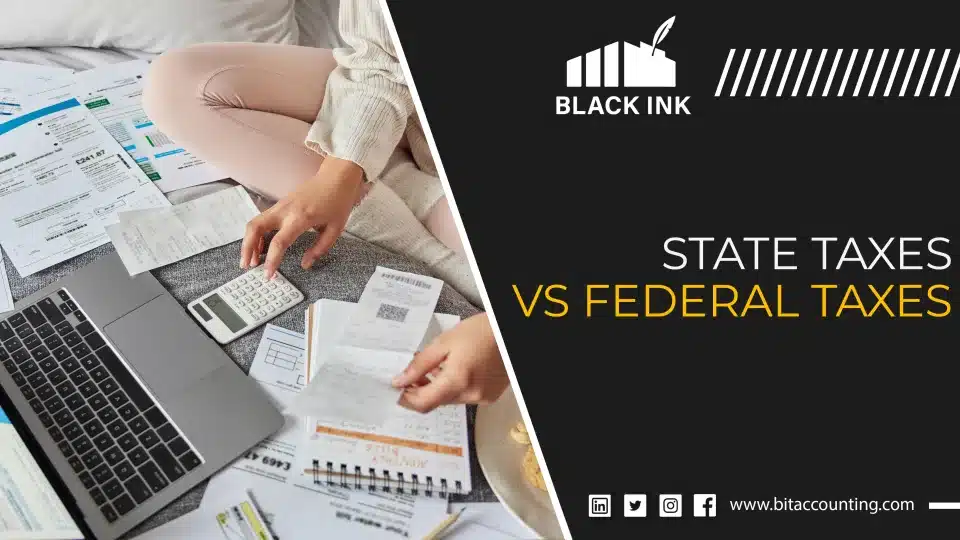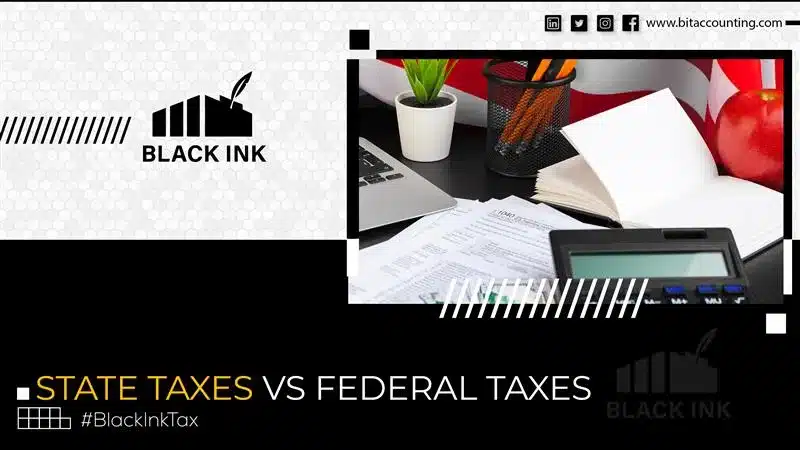
Table of Contents
State Taxes vs Federal Taxes: Which One Hits Your Wallet Harder?
In the United States, taxation is split between the federal government and individual states. Each one pulls from your income, purchases, and property to pay for different services—from national defense to local schools. The impact of these taxes on your wallet can vary wildly depending on where you live, how much you earn, and how you spend.
In this blog, we’ll break down the differences between state taxes vs federal taxes, explore how they affect you, and help you figure out where your money is really going. We’ll also show you some smart ways to keep more of it in your pocket.
What Are Federal Taxes?
Federal taxes are the payments you make to the U.S. government. These taxes help fund national programs like Social Security, the military, healthcare, disaster relief, and more. The Internal Revenue Service (IRS) is the agency in charge of collecting federal taxes and making sure taxpayers follow the law.
These taxes apply no matter where you live in the country, making them a core part of taxation in the United States.
Types of Federal Taxes
Here are the main types of federal taxes you’ll run into:
1. Income Tax
This is the big one. Federal income tax is based on how much money you earn. It’s a progressive tax, meaning the more you make, the higher your tax rate. The U.S. uses tax brackets to figure out how much you owe. Your filing status (like single, married, or head of household) also affects how much tax you pay.
2. Payroll Taxes
These are taken straight out of your paycheck and go toward Social Security and Medicare. While you and your employer split the cost, it still cuts into your net income.
3. Capital Gains Tax
If you sell stocks, real estate, or other investments for a profit, you may owe a capital gains tax. This includes earnings from passive income and is part of capital gains tax in the United States.
4. Estate Tax
When someone passes away and leaves behind a large amount of wealth, the government may collect a portion of it. This is called the estate tax.
5. Corporate Tax
Big companies also pay taxes on their business income. This corporate tax helps fund national services and is a part of corporate finance and public finance systems.
How Federal Taxes Affect You
Because federal taxes are progressive, higher earners pay a bigger share. But don’t worry—there are ways to lower your tax bill.
Tax Deductions and Credits
You can reduce your taxable income using deductions like the standard deduction or by itemizing. Tax credits, like the Earned Income Tax Credit (EITC) or Child Tax Credit, directly reduce how much you owe. These help support family economics and personal finance goals.
Federal taxes play a huge role in shaping the economy of the United States, funding services that affect everything from your retirement to your roadways.
What Are State Taxes?
Now, let’s talk about state taxes. These are taxes set by your state government to fund things like public schools, roads, and local health programs. Unlike federal taxes, they vary a lot depending on where you live.
Some states collect more taxes to fund generous public programs. Others collect less and shift the burden to things like sales tax or property tax. This patchwork system makes state taxation a key factor in the cost of living across the country.
Types of State Taxes
Here’s what state-level taxes may include:
1. State Income Tax
Some states charge a flat tax (same rate for everyone), while others use a progressive tax system. And guess what? Nine states—including Texas, Florida, and Wyoming—have no state income tax at all!
2. Sales Tax
When you buy goods or services, you often pay a sales tax. This varies by state and sometimes even by city. Sales taxes in the United States are a common way to collect revenue without hitting your paycheck directly.
3. Property Tax
If you own a home, you’ll pay property tax to your local government. It’s based on your home’s value and helps fund public services, schools, and safety programs.
4. Excise Taxes
These are extra taxes on specific items like gas, alcohol, and tobacco. They help pay for services tied to those products—like road repair from fuel taxes.
5. State-Specific Taxes
Some states add unique charges. For example, California has a mental health tax on high-income earners.
How State Taxes Affect You
Where you live has a major impact on how much you pay.
- States like California and New York have high income tax rates, especially for wealthier folks.
- States like Nevada, Tennessee, and South Dakota have no income tax—but may make up for it with higher sales and property taxes.
- Whether a state uses a flat rate or progressive tax system also affects your take-home pay.
Combined with federal taxes, state taxes shape your full tax burden—and ultimately, your personal income.

Comparing the Impact: State Taxes vs Federal Taxes
Now that we’ve looked at both sides, let’s compare how they hit your wallet.
Which Takes a Bigger Bite?
In general, federal taxes make up the largest portion of your tax payments. That’s especially true for middle- and high-income earners.
However, in high-tax states like California, the combined burden of state and federal income taxes can climb to nearly 50% for top earners. That’s why state taxes vs federal taxes is more than just a numbers game—it depends on your income, lifestyle, and location.
Case Studies: Tax Burdens in Different States
Let’s walk through a few examples.
1. High-Income Earner: California vs. Texas
- In California, someone earning $500,000+ could face a state tax rate of over 13%—on top of federal income tax.
- In Texas, there’s no state income tax, making it more favorable for high earners.
2. Middle-Class Family: New York vs. Florida
- A family in New York may face a high cost of living, higher state income taxes, and pricey property taxes.
- That same family in Florida could enjoy no income tax and lower housing costs, reducing their overall tax incidence.
3. Retiree: Pennsylvania vs. Washington
- Pennsylvania offers tax breaks on pensions and retirement income.
- Washington has no income tax but higher sales taxes, which can add up for seniors on fixed incomes.
Hidden Costs: Sales & Property Taxes
People often overlook sales and property taxes, but they can take a big bite, especially in states with no income tax.
- Washington (state) and Nevada have no income tax—but have some of the highest sales tax rates in the nation.
- New Hampshire has no sales or income tax—but its property taxes are among the highest.
These hidden costs affect your total financial picture and should factor into any tax policy discussion.
Tax Deductions & Credits That Help
Some relief is available at the federal level. For example:
- The SALT deduction lets you deduct up to $10,000 of state and local taxes on your federal return.
- Federal tax credits like the EITC and Child Tax Credit can significantly lower your tax return amount.
Strategies to Minimize Your Tax Burden
Now that you understand the tax landscape, here’s how to reduce what you owe:
Federal Tax Optimization
- Max out your 401(k) or IRA to lower taxable income
- Use tax loss harvesting to offset gains
- Claim all available tax credits and deductions
State Tax Optimization
- Think about relocating to a tax-friendly state if your income is high
- Appeal your property tax bill if your home is overvalued
- Delay big purchases if your state has a high sales tax
Working with a Tax Professional
Hiring a CPA or enrolled agent can help you navigate complex rules from the Internal Revenue Code to state laws. Tax planning isn’t just for the wealthy—it can help anyone boost their personal finances and stay compliant.
Future Trends in Taxation
Tax laws don’t stand still. Here’s what to watch:
- Federal tax brackets could change, especially with the Tax Cuts and Jobs Act expiring soon
- States are adjusting rules for remote workers
- Digital sales tax rules are expanding, affecting online shopping
- Political shifts can lead to big changes in fiscal policy
Staying informed helps you plan better and protect your money.
Conclusion
When it comes to State Taxes vs Federal Taxes, both can shrink your paycheck—but in different ways. Federal taxes are often bigger, but state taxes vary widely and can catch you off guard.
Want to lower your tax burden? Work with pros like BIT Accounting. Our team helps taxpayers and businesses across the U.S. keep more of their money with smart strategies and tailored support.
FAQs
1: Which is worse, state or federal taxes?
Federal taxes usually cost more, but in high-tax states, your combined burden can be huge.
2: Can I avoid state income tax?
Yes! Move to a no-income-tax state like Texas, Florida, or Wyoming.
3: Do I still pay federal taxes if my state has none?
Yes, federal taxes apply no matter what state you live in.
4: Are tax credits better than deductions?
Often yes. Credits reduce your tax bill dollar-for-dollar, while deductions lower your taxable income.
5: What’s the SALT deduction?
It lets you deduct up to $10,000 in state and local taxes from your federal return—but this cap may change in the future.
GET FREE QUOTE FOR ALL OF OUR SERVICES
Black Ink will send you a free analysis of your current state and what would be the cost of managing either a separate accounting and bookkeeping services or a complete solution across New York, USA. Do get in touch and we will be happy to consult you with our bookkeeping services in NY, New York, USA.
